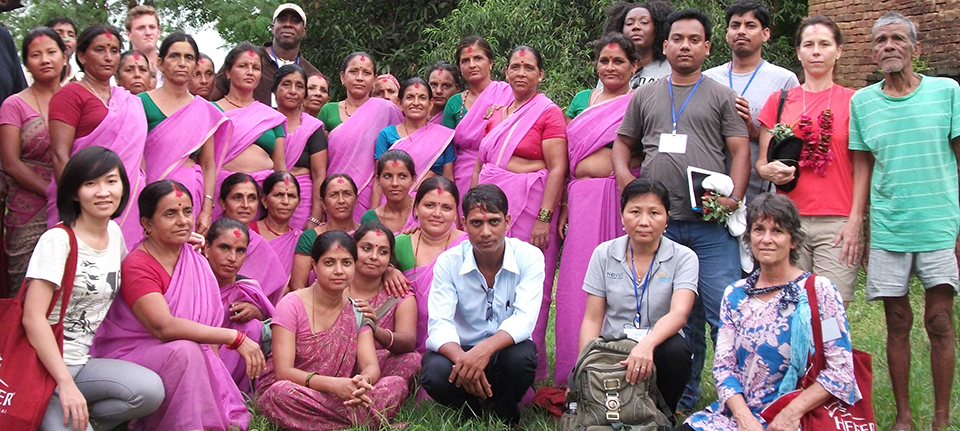The Bhagwati Women’s self-help group (SHG) of the community of Bhagwati Tole in the Nawalparasi District of Nepal was formed in February 2009. From the beginning, these women have been creating waves of change in their multicultural and ethnically diverse community.
Original settlers from various parts of Nepal migrated to Bhagwati Tole, resulting in a community of different cultures and ethnicities. Residents didn’t have much interaction, making members of each group feel like migrants in their own community.
A pattern of gender imbalance was prevalent within families. Education wasn’t considered important for women, so they weren’t sent to school and couldn’t even write their own names. With no help from the men, women were solely responsible for cooking, cleaning, taking care of children, feeding livestock and farming. They didn’t travel outside their community, and everything outside the home was strange and uncertain.

Along with alcoholism and gambling, the community was plagued with poverty. Extortion by wealthy lenders and landlords was commonplace. Inadequate access to credit forced impoverished farmers to take loans from local lenders, who would charge high interest rates, trapping farmers in a never-ending cycle of poverty.
Now, in 2013, the scenario has changed completely. In addition to the Bhagwati Women’s SHG, a men’s group and youth group have been created. Every member of the community has participated in Heifer’s 12 Cornerstones for Just and Sustainable Development training. The Cornerstones values are a way of life for the whole community, regardless of gender and caste.
With gifts of livestock and trainings, the Bhagwati women have been able to produce much greater outputs. By applying improved animal management techniques, they have increased livestock productivity. Almost every member started maintaining a kitchen garden.
Through regular savings and collective works, they raised 660,600 Nepalese Rupees, or about $6,255, by June 2013. Group members have mobilized the fund for individual production activities, as well as collective investments, including a tractor and threshing machine.
The women have planted fodder and forage on about 5 acres, and they lease about 130 acres to community members for additional farming activities. This agreement has saved the community 1,000,000 Nepalese Rupees, or about $9,468 a year, on hay, as well as improved residents’ livestock productivity and income.
After attending Heifer’s Cornerstones training for spouses, the men decided to form their own community development group. They sought and received support from the Village Development Committee to develop underground water drilling. Before, farmers suffered low land productivity and loss due to the lack of irrigation. Their efforts are paying off. Farmers who were only able to harvest crops that would sustain their family for six months now produce enough for a whole year. In addition to crops, farmers who previously had to purchase vegetables from local markets now grow organic vegetables in kitchen gardens, increasing their nutrition as well as surplus income.
Realizing the importance of education, the women’s group worked to transform the community’s Naba Nepal Junior High School into an English-medium school, where English is used as the primary language for instruction. Thanks to volunteer and fundraising efforts by the Bhagwati youth club and other community members, enough money was raised to support the teachers.
After participating in Heifer Nepal’s Values-Based Literacy Program, the women of the Bhagwati SHG learned to read and write. Now, they can all write their own names, keep accounts of family transactions, read signs, and recognize addresses on local buses, which they frequently ride on trips outside their communities.
With support from the community, the group managed to prohibited alcohol consumption and gambling, except for a couple of days a year during the major Hindu festivals of Dashain and Tihar. This has alleviated the problems with alcoholism and gambling that were so prevalent before.
The group is engaged in many philanthropic activities, including providing scholarships to needy children and giving cash donations to people with medical conditions.
Member Gita Neupane remembers not having enough money to send her three children to school. Local lenders assumed she wouldn’t be able to pay them back, so they declined to lend her money. Her own relatives were even hesitant to loan her money. There were times when a single pencil had to be broken into three pieces, one for each child. She remembers crying along with her children when they ran out of pages to write on in their notebooks. Now, she proudly shares that her two oldest children are in college. Her son is studying chartered accountancy and her daughter is studying education. Gita’s youngest daughter is well on her way to graduating high school.
Bhagwati Women’s SHG is made up of numerous success stories like Gita’s, and each woman has found solace in the group.
Empower a woman...empower a community.